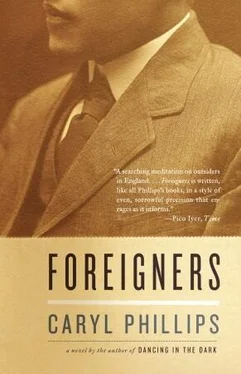Unable to immediately find sleep, I hoisted myself upright and squinted about the dismal chamber. Then I lit the candle and reached over and pulled the precious object from the pocket of my waistcoat. The tortoiseshell watch, which I had been led to understand the doctor had paid Mudge and Dutton the princely sum of seventeen guineas to purchase in 1768 had, on his death, been bequeathed by Johnson to his beloved negro. Apparently, as the result of a sale born of desperation, the watch had fallen into the hands of the Canon of Lichfield, at a time when the high and mighty of this city had taken advantage of the black's innocence and poverty and stripped him of all mementoes of his master. Two owners later, the watch had come into my possession at a sale of Johnsonian relics at a London coffee house, and for the past year I had kept it close to my person. I harboured some notion of presenting the watch to the negro in exchange for some testimony about the vicissitudes of his recent life, but it now appeared that the delicate timepiece would remain safely in my keep. I replaced the watch and blew out the candle, and in the darkness I allowed my mind to ruminate upon the strange case of poor Francis Barber who, along with the late writer Gustavus Vassa, was, at one time, probably the foremost negro in England. Sad that this man should have come to an unfortunate end in a place such as Lichfield, but it was possible that my curiosity about the negro's later years might now be satisfied by an audience with his widow. I cast my mind back to the malodorous carriage ride that I had shared with Francis Barber as we journeyed to the funeral of his master, and I remembered our one short conversation. I thought then, and on many other occasions previous to the day of the funeral, that being dependent upon a negro was a remarkable situation for England's greatest literary man to find himself in. Nevertheless, Dr Johnson remained a vocal and vigorous protector of his negro, who he always treated as a son as opposed to a man at his beck and call.
As far as I could ascertain this unique relationship had begun in the middle part of the century when Barber, then only a young boy, and not yet refined by a full exposure to civilisation, arrived on Johnson's doorstep in London. Some few years earlier, the eight-year-old piccaninny had been sold on a plantation in his native Jamaica and brought to England by a Colonel Bathurst. It is said that the boy's original name may well have been Quashey, and it is understood that his value was most likely five pounds or thereabouts. Bathurst and the boy arrived in England in 1750, whereupon Colonel Bathurst chose to live in Lincoln with his son Richard, a doctor of medicine. It was decided that the young Quashey, newly named Francis, should be sent to Yorkshire to attend the Revd William Jackson's school in the hamlet of Barton, where it was hoped that he might acquaint himself with reading and writing. The negro boy remained in Barton for two whole years, during which time he achieved some knowledge of the English language, and then the now cheerful, and surprisingly gentle, ten-year-old boy returned to Lincoln and began service as the younger Bathurst's servant. It soon became clear that Dr Richard Bathurst had no desire to use the boy as an exotic ornament and dress him as a negro page in bright satins and a turban; he was, instead, actively looking for some role in society that the boy might profitably fulfil. As it transpired, Dr Bathurst's closest friend was none other than the literary man, Samuel Johnson, who, around this same time, lost his wife Tetty to a lingering and painful disease, which left Johnson all alone in a large house in London with neither company nor help. Richard Bathurst understood that his dear friend regarded solitude as a horror, for his sensitive mind was dangerously vulnerable to morbid reflections. In these circumstances, the younger Bathurst thought it only proper to pack Francis off to London in order that he might make himself useful to a depressed Dr Johnson.
On first encountering his future master, the ten-year-old boy was shocked by the sight of this large, shambling man who seemed to twitch uncontrollably about the shoulders, and whose face appeared to be painfully contorted, perhaps to compensate for an obvious blindness in one eye. The scars around this man's throat were terrifying and formed a red lumpish collar, and young Francis found it difficult to tell when Johnson was speaking to him or simply muttering to himself, for there seemed to be little division between the two modes of expression. The nervous Jamaican negro boy entered the service of Samuel Johnson, who informed the dusky stranger that he imagined this Jamaica to be 'a place of great wealth and dreadful wickedness, a den of tyrants and a dungeon of slaves', but the poor boy could make no reply for his mind was now almost totally cleansed of memories of his birthplace.
Johnson took immediately to the young black child, who was now styled Francis Barber, but like his friend Dr Bathurst, he too had no desire to impress his peers by dressing the negro as a satin-clad page or forcing the child to wear livery of any sort. He was aware that ostentatiously attired blacks were now commonplace in London society, appearing in law courts, answering doors, marrying servants, running errands, sitting for portraits. In literature they were making minor appearances in the novels, plays, and the poetry of the age, but to Johnson's eyes the negro, generally through no fault of his own, often lacked a certain civility. Johnson set about the task of saving the young heathen's soul, teaching him to pray and providing him with some basic religious instruction, but the literary man soon discovered that the boy's spirit appeared to be resistant to being given information as to how he should conduct himself. The boy also displayed a lack of enthusiasm in applying himself to even the most basic of household chores, and this was a cause of some surprise to his master, although in most circumstances the general untidiness of his living quarters never seemed to trouble Johnson greatly. After all, Johnson was a man preoccupied with literary matters and he had little time to waste on domestic issues, but he did have some understanding of the possible source of Francis' reluctance to follow orders. Dr Bathurst's father, the planter and former colonel in the Jamaican militia, had recently suffered great financial losses which threw all of his affairs into disarray, and then he had suddenly taken ill and died. However, his will contained a clause which granted young Francis Barber his freedom and the bountiful sum of twelve pounds, which greatly pleased Johnson who was firmly wedded to the belief that no man should by nature be the property of another. Clearly this unexpected benevolence had fed Francis' sense of himself as being somewhat independent and beyond any jurisdiction, but Johnson's personality was such that he found it relatively easy to overlook the boy's rebellious behaviour.
It was during this period that Miss Williams, the middle-aged daughter of a Welsh physician with whom the doctor had become friendly, established herself as a permanent occupant of the house, and she made it her business to reign over the domestic arrangements with a fist of iron. Despite her blindness, she found little difficulty ranging up and down the dangerous stairs, from the kitchen in the basement to her own room beneath Johnson's study, which was located in the garret near the very apex of the house. Miss Williams was a strict disciplinarian who seldom ate more than plain bread with butter, but she drank copious quantities of tea, and she saw little reason why others should indulge themselves beyond her own rigorous diet. Miss Williams was prepared to tolerate the doctor's peculiar, and sometimes offensive, manners, but she had little patience with any others who sought to resist her rule.
Читать дальше











![Unknown - [Carly Phillips] The Bachelor (The Chandler Brothe(Bookos.org) (1)](/books/174132/unknown-carly-phillips-the-bachelor-the-chandle-thumb.webp)
